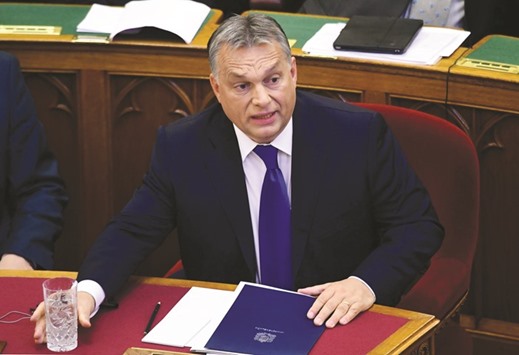Hungary’s prime minister has vowed that Budapest would still reject the EU’s controversial migrant quota plan, despite low turnout in a referendum on the issue invalidating the vote.
A day after 98.3% of voters backed his hardline stance on migrants, Viktor Orban hailed the result as an unprecedented mandate to stop Brussels encroaching on national sovereignty.
Orban said that he would introduce a bill in the coming days to amend the constitution and reflect “the will of the people in the spirit of the referendum”.
“In the history of Hungarian democracy, no party or party alliance has ever received a mandate of such scale,” Orban told an applauding parliament in Budapest. “We won’t let these 3.3mn people be tricked, or have their opinions downplayed.”
In another blow to the EU four months after Britain voted to leave the bloc, the referendum saw Hungarians – or rather, those who voted – almost unanimously back Orban’s bid to spurn an EU proposal seeking to share migrants around the 28-member bloc via mandatory quotas.
But after a campaign in which government billboards and TV campaign linked migrants with “terrorism” and crime, the ballot was declared invalid with only 40.1% casting valid votes, well below the 50% minimum.
This was due in part to people heeding a call from opposition parties, non-government organisations and activists to boycott the referendum or spoil their votes.
More than 230,000 invalid ballots were recorded, a record for a Hungarian referendum.
Comparing immigration to “poison”, Orban has emerged as the standard-bearer of those opposed to German Chancellor Angela Merkel’s “open-door” policy, as the bloc battles its worst migration crisis since World War II.
His referendum hiked further pressure on the quarrelling EU, already weakened by the “Brexit” referendum result – a decision that Orban has blamed on Brussels’s handling of the migrant crisis.
EU Parliament President Martin Schulz had warned on Sunday that Orban was playing “a dangerous game” by attacking EU treaties to cement his power at home.
Hungarians “did not heed Orban’s call. What the EU now needs is dialogue to deliver solutions, not artificial tensions”, he tweeted yesterday.
The European Commission, the EU’s executive body, said that there was “no silver bullet” to solving the migration crisis, but said “a holistic approach” was required.
The European Union migrant quota proposal – spearheaded by Merkel and approved by most EU states last year – aims to ease pressure on Italy and Greece, the first port of arrival for most migrants.
But implementation has been slow, with just 5,651 out of a hoped-for 160,000 people relocated so far, with eastern and central European countries in particular opposed.
Austrian Foreign Minister Sebastian Kurz warned that it would be “a mistake” to dismiss the Hungarian referendum.
“There are many states in Europe, which think similarly to Hungary and are unhappy with the politics in Brussels,” he told German media on Sunday evening. “I said from the start that the relocation plan wouldn’t work.”
More than 400,000 refugees trekked through Hungary towards northern Europe in 2015 before Hungary sealed off its southern borders with fences topped with razor wire in September.
Other countries on the so-called Balkan migrant trail followed suit, leaving some 60,000 stranded in Greece.
The EU said last week that it hoped to relocate half of them by the end of 2017.
A deal struck in March with Ankara to halt the influx looks shaky in the wake of a coup attempt in Turkey in July.
Analysts told AFP that the planned constitutional amendment was likely to seek to enshrine Hungary’s right to decide its own migration policy.
“It looks like (Orban) wants to continue his fight with the EU on its migration policy, and the constitutional amendment is his way of doing that as it might trigger legal fights” with Brussels, said expert Bulcsu Hunyadi from the Political Capital think tank in Budapest.

Orban: In the history of Hungarian democracy, no party or party alliance has ever received a mandate of such scale.
